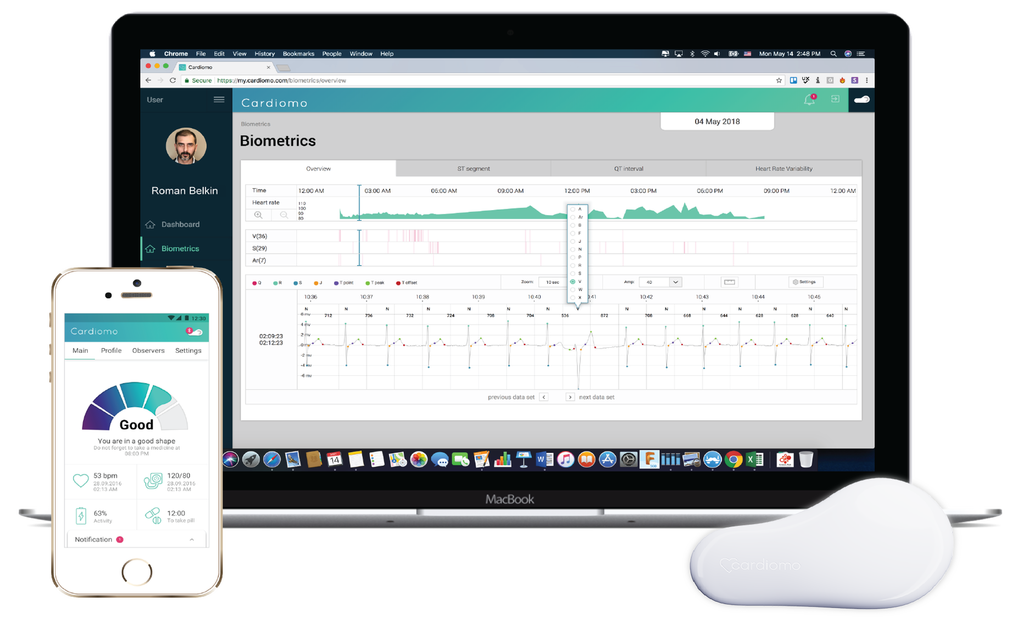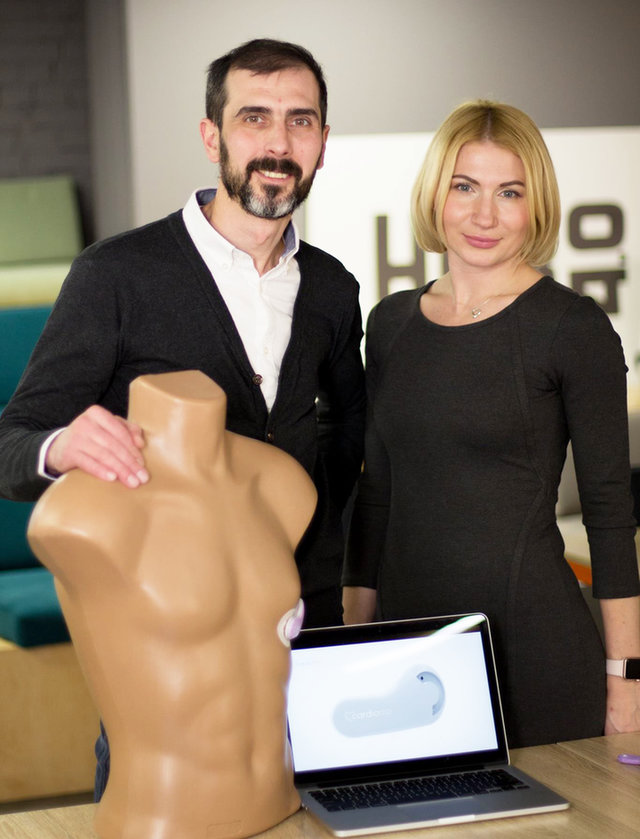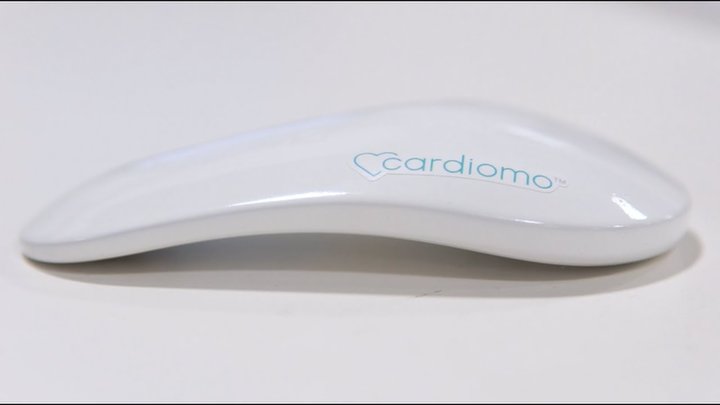A Love Child of ECG
and IT innovation
Cardiomo
Driven by the idea of possibility to save millions of lives, Cardiomo's innovative, continuous real-time medical-grade cardiac monitor provides AI-powered actionable insights to enable early warning for heart diseases.

By Gergana Koleva
Ksenia Belkina has been criss-crossing continents non-stop. She symbolizes the vision, grit and bootstrap instinct of women entrepreneurs the world over: despite being a mother of two young daughters, she spent all of her own savings to build a startup in the healthcare space with an innovative product that can impact the life of many, and made hard decisions to uproot her home and move her base from Kiev, Ukraine to New York – all of this in the span of just two years.
She had to radically change her lifestyle. Focusing on product development, attending conferences to meet potential investors and clients, and giving up her yoga practice for running sprints whenever she could find a gap in her hectic schedule, the former Ukrainian Parliament worker has traded the predictable flow of briefing local politicians for interviews to giving interviews and high-stakes presentations herself.
Her startup Cardiomo makes a wearable real-time medical-grade cardiac patch monitor. In a market teeming with portable ECG devices that tout patient autonomy and self-management as their value to users, Cardiomo sets itself apart by empowering families to check in on loved ones with heart disease who have a harder time coping alone. The safety net it weaves around people has catapulted the startup to the attention of social impact investors.
“The idea for Cardiomo came about when Roman´s mother mentioned she had been having heart problems for some time, but hadn´t told anyone about it until then because she didn´t want to worry her children,” says CEO Ksenia Belkina, recounting her husband´s personal experience as the initial motivation for the company, which the couple co-founded in 2016. “Only during the very first investor pitch, when his pulse went up too high, did he recognize that Cardiomo can be used not only by elderly people but also by sportsmen and people in cardiovascular disease risk groups
as well.”
Fortunately, investors showed interest and shortly after that first pitch Cardiomo got its first injection of capital. “We believed in our product so much that we were even ready to sell the house if we hadn´t found an investment,” says Belkina.
In the three years since then, the family has moved to New York together with their young daughters to join a startup accelerator program and Cardiomo has shot to international fame, winning nearly 30 awards and recognitions from TechCrunch in Poland to HIMSS in Finland to the IOT/WT Innovation World Cup in San Francisco. In 2018, Belkina, who has advanced degrees in psychology and international relations, was named #1 on Ukraine´s Most Influential Woman list by the European Business Development Association and Ukraine Woman magazine for her contribution to business services in the country. Most recently, Cardiomo received a “Best New Wearable Technology Device” distinction at the IDTechEx show in Santa Clara last November. And while its eponymously named mobile ECG device awaits FDA clearance and CE mark approval, it has amassed over 1600 pre-orders and counting from clinics and cardiac centers that want to try it out.

How it works
The device, which comes in the shape of an ergonomic patch and is intended to be worn continuously, captures ECG, heart rate variability, skin temperature, respiratory rate, body position, physical activity, and sleep patterns data. In fact, it is more aptly defined as an ecosystem. Apart from collecting personal biometric information, its sensors register air quality and weather conditions to help its AI algorithm – and the user´s physician and care teams – detect associations between heart health and internal and external factors. The real-time data it transmits is linked to a smartphone app and a HIPAA-compliant cloud-based dashboard, and in case unusual heart activity is detected, it sends notifications to the user, their connected family members or relatives, and their care provider.
The alerts are triggered by Cardiomo’s proprietary AI algorithm, which has been trained on 50,000 cardiograms and correlates the baseline learning with individual heart patterns it observes throughout the continued use of the device. The algorithm uses five neural networks to analyse heart beats, QRST complex, artifacts, and irregularities in heart function, and can not only detect existing arrhythmias, but also predict imminent risks based on changes in patient condition hours before a serious event occurs. In the case of older users, the device can also detect falls thanks to an embedded 3-axis accelerometer and gyroscope.
Belkin, who has advanced degrees in IT and hardware engineering, was instrumental in developing the underlying technology on which Cardiomo runs, while his wife worked on operationalizing the device´s interaction design in the context of health systems with many path dependencies.
“Even minimal medical care delivered on time can mitigate serious heart conditions and reduce mortality, supporting older people through more personalized care and helping them age well. Cardiomo´s approach will transform the care people receive through GP services and help ensure health and social services are built around the needs of local populations,” says Belkina.

Road ahead
“We are confident that the future belongs to miniature implantable devices. Already, there are many such devices available to people with serious rhythm disturbances, whose lives they can save, but soon there will be more innovations that monitor not only the state of the heart, but the state of the whole organism. They will replace both medical-grade heart monitors and fitness bracelet and smartwatches,” predicts Belkina. She is nurturing the concept for a sister device to the original Cardiomo aimed at empowering pregnant women to monitor their babies´ heartbeat without necessarily visiting a doctor.
Along with the intention to develop heart monitoring technology that helps expecting mothers, Belkina and her partner are confident that successful integration of the Cardiomo device into clinical practice will help mainstream digital health services as part of healthcare systems everywhere. The duo hopes their heart monitoring device will also convince remaining sceptics that it can be instrumental in achieving long-term care goals in preventing heart attacks and strokes.
As well, the founders link their mission as a health tech startup to three broader trends shaping the industry: AI-powered diagnostic tools to reduce human error and allow care teams to cover more patients without compromising quality, Internet of Medical Things to remotely monitor patients´ health, and telehealth solutions that incorporate wearables, real-time data, and video-based consultations as part of comprehensive preventive care programs.
“We started the company initially to provide remote monitoring of lonely elderly people with cardiovascular risks. The more we have been developing the product, the more we realized the impact of our solution and the size of the problem, as the numbers of global CVD deaths keep growing. Our team is developing a truly socially important, innovative and necessary product for millions of people,” says Belkina.
The algorithm uses five neural networks to analyse heart beats, QRST complex, artifacts, and irregularities in heart function, and can not only detect existing arrhythmias, but also predict imminent risks based on changes in patient condition hours before a serious event occurs. In the case of older users, the device can also detect falls thanks to an embedded 3-axis accelerometer and gyroscope.
Even minimal medical care delivered on time can mitigate serious heart conditions and reduce mortality, supporting older people through more personalized care and helping them age well. Cardiomo´s approach will transform the care people receive through GP services and help ensure health and social services are built around the needs of local populations.

The idea for Cardiomo came about when Roman´s mother mentioned she had been having heart problems for some time, but hadn´t told anyone about it until then because she didn´t want to worry her children,” says CEO Ksenia Belkina, recounting her husband´s personal experience as the initial motivation for the company, which the couple co-founded in 2016. “Only during the very first investor pitch, when his pulse went up too high, did he recognize that Cardiomo can be used not only by elderly people but also by sportsmen and people in cardiovascular disease risk groups as well.
